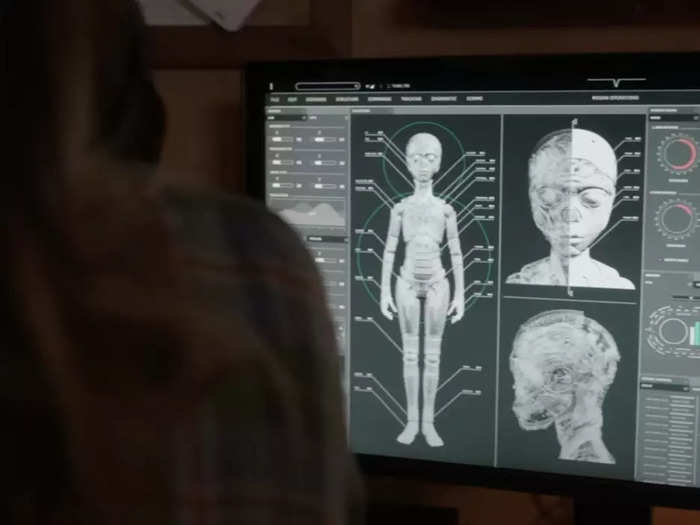- Home
- entertainment
- news
- What 'M3gan' gets wrong about AI, according to experts
What 'M3gan' gets wrong about AI, according to experts
Elana Klein

- "M3gan" surprised critics by grossing over $30 million during its opening weekend.
- Insider spoke to AI experts about the likelihood of a doll like M3gan existing.
Gerard Johnstone's "M3gan" raises questions about the potential dangers of artificial intelligence.

In the movie, Gemma, played by Allison Williams, suddenly gains custody of her orphaned niece, Cady, and creates M3gan — a life-like artificially intelligent doll — to serve as Cady's best friend and caretaker. Quickly, the robot programmed to provide comfort and companionship becomes possessive, manipulative, and goes to violent extremes to protect Cady.
Projected to bring in no more than $20 million during its opening weekend, "M3gan" exceeded critics' expectations, ultimately grossing above $30 million following its January 6 release, Variety reported. The movie's success continues a streak of low-budget horror movies, including "Smile" and "Barbarian," performing well at the box office.
In the creepy-doll-meets-AI-gone-wrong story, director Gerard Johnstone combines horror and sci-fi to concoct a terrifying depiction of a future in which machines possess abilities to exhibit empathy, act as close companions, and commit violent crimes.
But could a doll like M3gan ever really exist? Insider spoke with two AI experts about the plausibility of Hollywood's newest eerie robot-doll.
It is unlikely that AI will ever simulate meaningful human-to-human companionship, like M3gan provides Cady in the movie, one expert said.

Gemma creates M3gan to tend to Cady's emotional needs while fulfilling the various duties of a parent.
Dr. Thomas Wolf, a co-founder of Hugging Face, which shares machine-learning models to help companies create their own tools for their businesses, pointed out that artificially intelligent companions already exist. Companies like Replika, he noted, provide users with companions, even "virtual girlfriends." Offering users the ability to chat with a bot that takes the shape of a virtual Sims-like avatar, Replika's motto is "Always here to listen and talk. Always on your side."
"I think, for everyone, it's nice to have AI that can answer in a polite, nice way," Wolf said.
Other than that, however, he is skeptical of AI's capability of substantial, authentic intimacy. "For people who are looking for real connection," he said. "I don't think you can replicate this type of deep connection."
"Even with humans," he added, "you can't be friends with everyone. We're already super picky, so this type of level [of emotional closeness] is not something we can reproduce [with AI]."
According to Wolf, humans best respond to emotional support from other humans.

In the film, M3gan demonstrates an ability to successfully comfort Cady as she grieves the sudden loss of her parents. Wolf explained that, in reality, when AI has been used to attempt to soothe people in distress, humans have responded with indifference.
"When people knew it was coming from AI, it actually was not really working," he said. "The effect was not there. Even if [the words] were the same, knowing who it comes from means a lot."
Dr. Alain Briançon, who has cofounded tech companies, including Kitchology, and served as chief technology officer at others, including Cerebri AI, shares Wolf's sentiment.
"If you know you're looking at a robot, it's difficult to suspend disbelief," he told Insider.
However, he believes that in the near future, we'll have robots that, aside from the look and feel of them, will be widely perceived as human. "We're three or four years away from people not being able to distinguish [between a human and a robot]," he said.
Experts agree that AI cannot spontaneously become violent.

Arguably the most disturbing aspects of M3gan are her capacity and lack of remorse for violence. Although Gemma programs M3gan to protect her niece at all costs, M3gan quickly perverts these instructions by committing acts of murder as a means to this end.
Briançon explained that while he does not foresee a future in which robots kill without explicit instruction to do so, artificial intelligence programmed to target human life is underway. In the near future, Briançon believes, "You're gonna get machines of war — drones or robots — that are exclusively programmed to kill, and do it in a smarter and smarter manner."
However, Briançon explained, AI is not designed to exhibit what he calls "reverse behavior," unless a human explicitly programs a given machine to perform the opposite function of what its programmer instructs.
"If someone wants to train a doll to kill, and make it a war machine, then, yes, that can happen," he said, "[but] something that spontaneously goes from the purpose of non-killing to killing, I see as pretty much implausible."
Wolf agreed. "[AI is] not deciding what it wants to do. Humans have free will, and AI doesn't have that," he said.
While murderous dolls like M3gan are not in our future, there are other things to worry about when it comes to AI, they said.

Briançon expressed two distinct fears regarding the future of AI, and "it's not a murdering doll," he said.
What we should really be worrying about, he believes, is "[the end of] the concept of the universal truth," specifically the prospect of deepfakes possessing "the ability to create an alternate reality that no one can distinguish."
"The truth has been anchoring civilization for the longest time," he said. "If we lose collective reality, there is no path back."
Further, he is fearful of "what AI can do with the tremendous amount of data that they know about you," specifically "the ability of bad actors to leverage your data." He believes the threat of this issue is far understated.
According to Wolf, the real danger lies in the existential questions that will start to arise as AI becomes more fine-tuned.
"You start to question yourself," he said. "If this computer can basically do 95 percent of what I can do, what does it mean to be a human?"
"We'll be rethinking the place we have in the world," he said. "I don't think we are ready at all for that as a society."
Popular Right Now
Popular Keywords
Advertisement